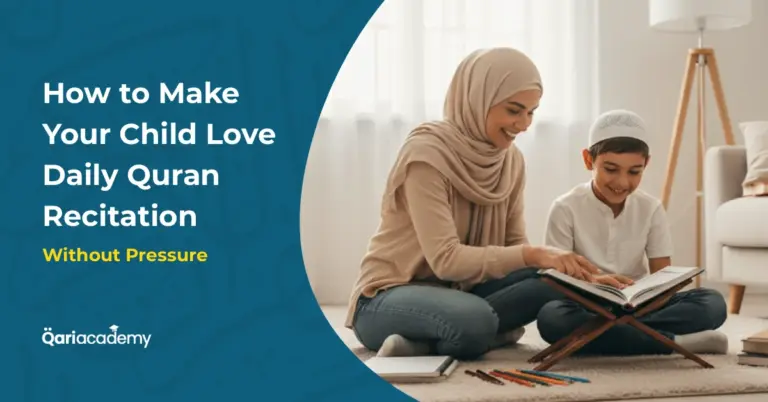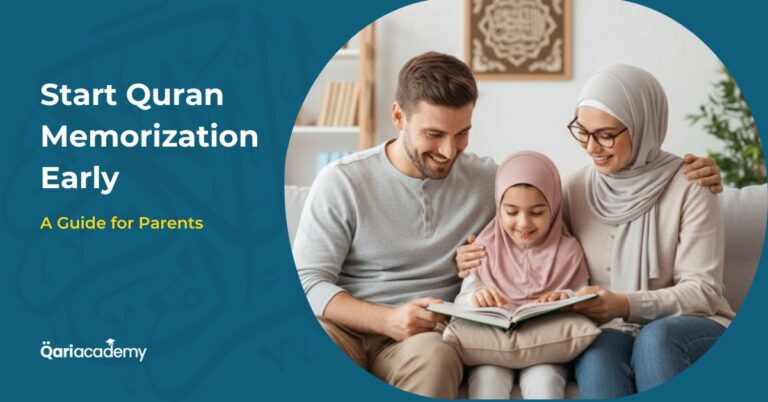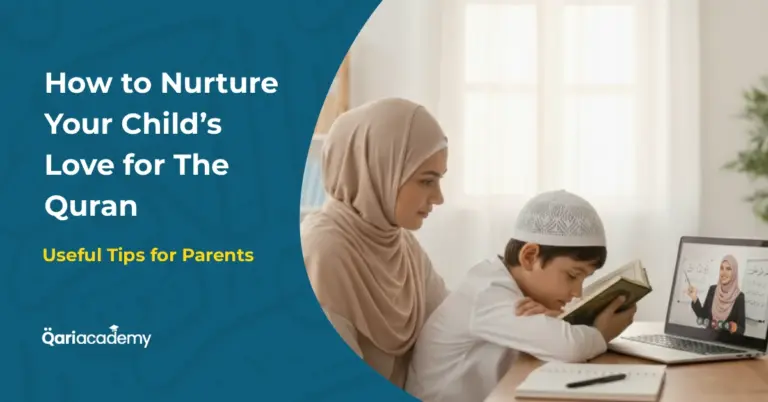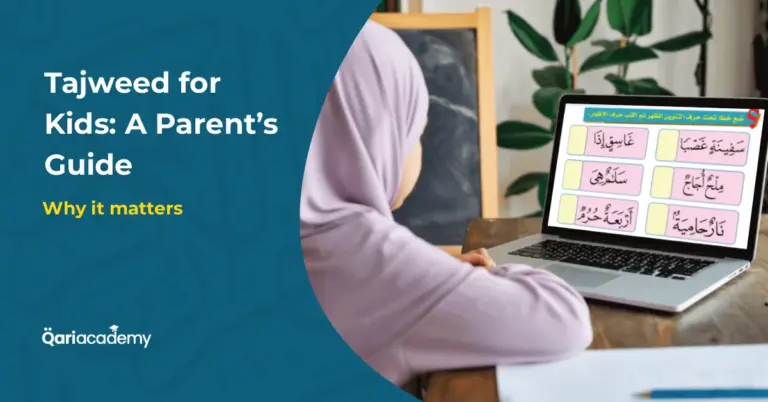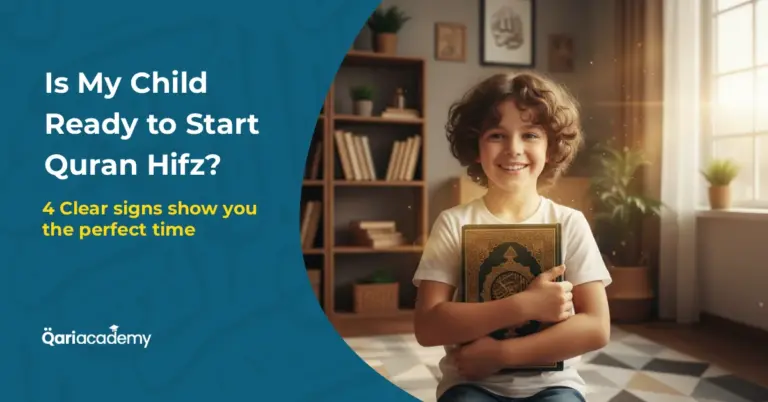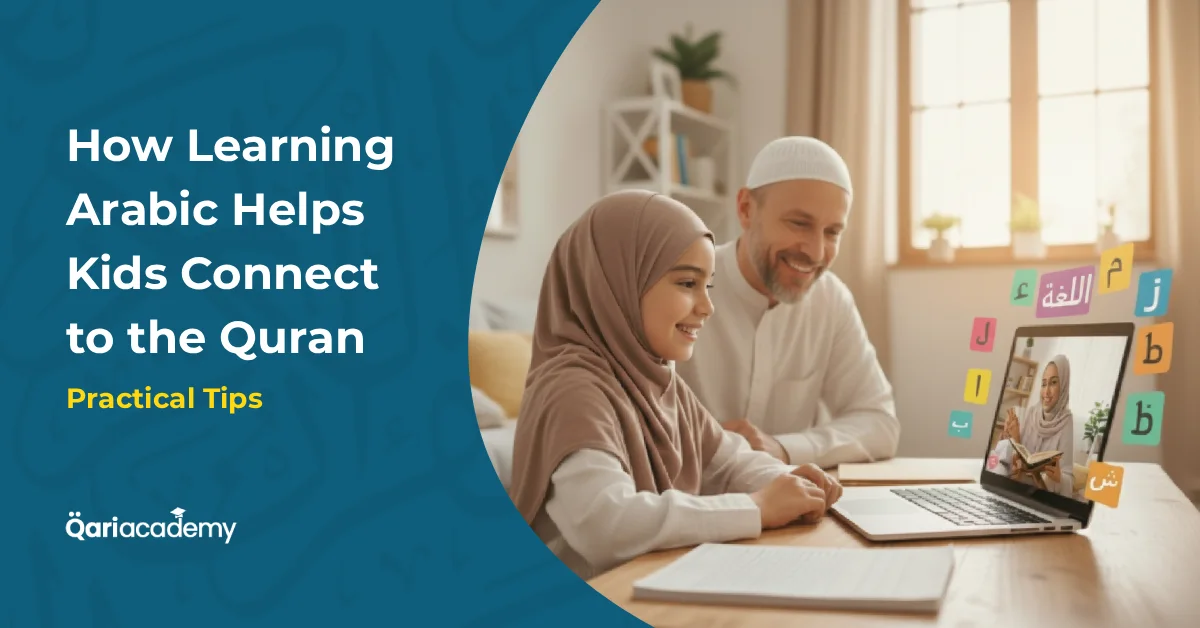
Introduction
For Muslim parents, helping children connect with the Quran is one of the greatest responsibilities. While translations provide a general meaning, true understanding, recitation, and love come through choosing to learn Arabic for kids. Arabic is not only the language of the Quran, but it also carries the depth, beauty, and spiritual guidance that translations alone cannot fully convey.
At QariAcademy, we emphasize that learning Arabic for kids is not just about acquiring a language. It nurtures a spiritual bond with the Book of Allah, strengthens Quran memorization, and builds a lifelong connection with Islam. Starting early allows children to develop comprehension, fluency, and love for the Quran, ensuring that their learning journey is meaningful, enjoyable, and inspiring.
Building a solid foundation in Arabic also improves children’s confidence in recitation, enhances their understanding of Islamic teachings, and encourages a lifelong love for learning. From recognizing basic Quranic words to understanding entire surahs, children gain both linguistic skills and spiritual insight.
Moreover, learning Arabic for kids promotes discipline, patience, and a sense of achievement. As children master new words and understand their meanings, they feel proud of their progress, which further motivates them to continue their Quran journey. By fostering curiosity and excitement around Arabic and the Quran, parents can ensure that children develop a strong spiritual connection from a young age.
Why Arabic Matters in Understanding the Quran
- Direct Access to Allah’s Words: Without Arabic, children rely on translations that may not fully convey the depth and beauty of Quranic expressions. By choosing to learn Arabic for kids, they experience the Quran in its original linguistic form, connecting with its meanings, rhythm, and eloquence.
- Stronger Memorization: Understanding words and their meanings makes memorization more effective and enjoyable. Children can internalize lessons more deeply, link verses with context, and recall them with confidence.
- Love for the Quran: When children recognize familiar words while reciting, they develop affection, excitement, and a desire to continue reading. This early love nurtures lifelong engagement and devotion to the Quran.
- Enhanced Comprehension: Learning Arabic for kids equips them to understand supplications, Duas, and Quranic stories, reinforcing their spiritual development and moral understanding.
- Boosted Confidence: Children who understand the language feel more confident when reading, memorizing, or explaining verses. Confidence in recitation encourages them to participate actively in family or school Quran activities.
Benefits of Learning Arabic Early
- Sharper Minds: Arabic learning boosts memory, critical thinking, and problem-solving skills, helping children excel academically and spiritually.
- Cultural Connection: Arabic links children to Islamic history, heritage, and traditions, giving full context to Quranic stories, Islamic etiquettes, and the teachings of the Prophet ﷺ.
- Confidence in Worship: Kids who understand what they recite in Salah and Duas experience a deeper spiritual connection, making prayers more meaningful.
- Future Readiness: Arabic fluency opens doors for advanced Islamic studies, Hifz programs, and potential careers in education or religious studies.
- Personal Growth: Early exposure to Quranic Arabic develops discipline, focus, and a love for learning that extends beyond religious studies.
- Stronger Family Bonds: Engaging in Arabic and Quran activities together can enhance parent-child relationships and make learning a shared, enjoyable experience.
Practical Ways Kids Can Learn Arabic Effectively
- Start with Quranic Words: Begin with commonly used words and phrases in the Quran, such as Rahmah (Mercy), Sabr (Patience), and Shukr (Gratitude). This makes memorization and recitation easier and more engaging.
- Interactive Games & Stories: Visual aids, storytelling, Halal songs, and educational games accelerate learning. Interactive activities keep children motivated and attentive.
- Daily Practice: Even 10–15 minutes of simple Arabic words each day builds a strong foundation. Consistency is more important than duration.
- Enroll in Online Classes: Online Arabic classes for kids provide expert guidance, structured lessons, and motivation. Teachers can correct mistakes early, personalize learning, and maintain consistent progress.
- Connect Lessons to Daily Life: Help children apply Arabic and Quranic lessons to real-life situations—kindness, honesty, patience, and respect.
- Celebrate Progress: Reward small achievements, like memorizing a new verse or pronouncing a word correctly, to maintain enthusiasm and motivation.
How QariAcademy Makes Arabic Learning Easy
At QariAcademy, we combine Arabic learning with Quran teaching, allowing children to benefit from both simultaneously:
✅ Native Arabic-speaking teachers with Ijaza
✅ Fun, interactive lessons for children aged 6–16
✅ One-on-one online classes tailored to each child’s pace
✅ Progress reports for parents to track improvement
✅ Focus on Tajweed for kids and Quran comprehension
✅ Free trial to ensure the child feels comfortable
By integrating these resources, children not only learn Arabic for kids effectively but also deepen their understanding and love for the Quran, laying a strong foundation for lifelong learning.
👉 Start your child’s Arabic and Quran journey today with a free trial at QariAcademy.com
FAQ
Q1: Can my child learn Arabic without prior knowledge?
A: Yes. Our beginner-friendly program introduces Arabic step by step, even if your child has no background.
Q2: Does learning Arabic help with Hifz (memorization)?
A: Absolutely. Understanding the words strengthens memory and helps children connect meaningfully with the Quran.
Q3: How long does it take for kids to understand basic Quranic Arabic?
A: Most children start recognizing and understanding common words within 3–6 months of consistent learning.
Q4: What’s the best age for kids to start learning Arabic?
A: The earlier the better—starting between ages 6–10 yields the strongest results.
Q5: How can parents support their child’s Arabic learning at home?
A: Encourage short daily practice, read along with your child, use interactive apps, and celebrate achievements to maintain motivation.

